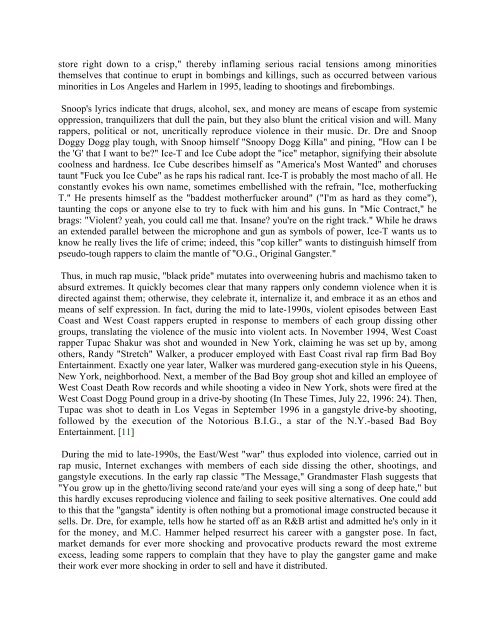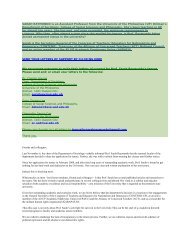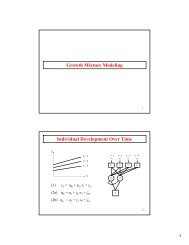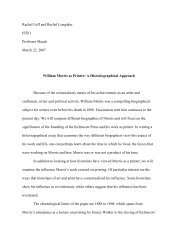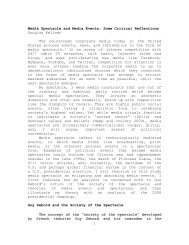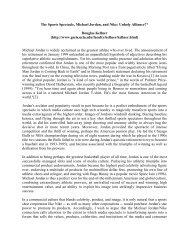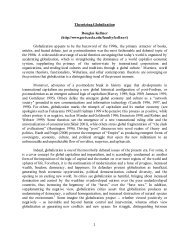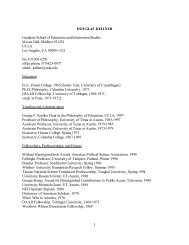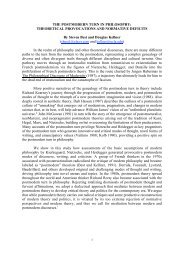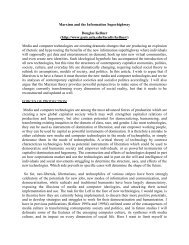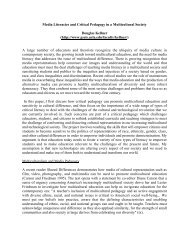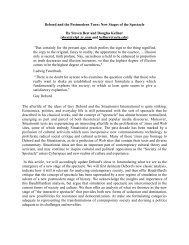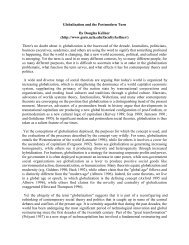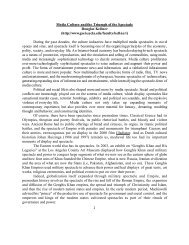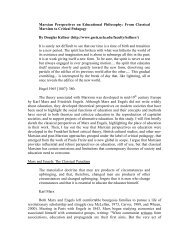Rap, Black Rage, and Racial Difference Steven Best and ... - UCLA
Rap, Black Rage, and Racial Difference Steven Best and ... - UCLA
Rap, Black Rage, and Racial Difference Steven Best and ... - UCLA
You also want an ePaper? Increase the reach of your titles
YUMPU automatically turns print PDFs into web optimized ePapers that Google loves.
store right down to a crisp," thereby inflaming serious racial tensions among minorities<br />
themselves that continue to erupt in bombings <strong>and</strong> killings, such as occurred between various<br />
minorities in Los Angeles <strong>and</strong> Harlem in 1995, leading to shootings <strong>and</strong> firebombings.<br />
Snoop's lyrics indicate that drugs, alcohol, sex, <strong>and</strong> money are means of escape from systemic<br />
oppression, tranquilizers that dull the pain, but they also blunt the critical vision <strong>and</strong> will. Many<br />
rappers, political or not, uncritically reproduce violence in their music. Dr. Dre <strong>and</strong> Snoop<br />
Doggy Dogg play tough, with Snoop himself "Snoopy Dogg Killa" <strong>and</strong> pining, "How can I be<br />
the 'G' that I want to be?" Ice-T <strong>and</strong> Ice Cube adopt the "ice" metaphor, signifying their absolute<br />
coolness <strong>and</strong> hardness. Ice Cube describes himself as "America's Most Wanted" <strong>and</strong> choruses<br />
taunt "Fuck you Ice Cube" as he raps his radical rant. Ice-T is probably the most macho of all. He<br />
constantly evokes his own name, sometimes embellished with the refrain, "Ice, motherfucking<br />
T." He presents himself as the "baddest motherfucker around" ("I'm as hard as they come"),<br />
taunting the cops or anyone else to try to fuck with him <strong>and</strong> his guns. In "Mic Contract," he<br />
brags: "Violent? yeah, you could call me that. Insane? you're on the right track." While he draws<br />
an extended parallel between the microphone <strong>and</strong> gun as symbols of power, Ice-T wants us to<br />
know he really lives the life of crime; indeed, this "cop killer" wants to distinguish himself from<br />
pseudo-tough rappers to claim the mantle of "O.G., Original Gangster."<br />
Thus, in much rap music, "black pride" mutates into overweening hubris <strong>and</strong> machismo taken to<br />
absurd extremes. It quickly becomes clear that many rappers only condemn violence when it is<br />
directed against them; otherwise, they celebrate it, internalize it, <strong>and</strong> embrace it as an ethos <strong>and</strong><br />
means of self expression. In fact, during the mid to late-1990s, violent episodes between East<br />
Coast <strong>and</strong> West Coast rappers erupted in response to members of each group dissing other<br />
groups, translating the violence of the music into violent acts. In November 1994, West Coast<br />
rapper Tupac Shakur was shot <strong>and</strong> wounded in New York, claiming he was set up by, among<br />
others, R<strong>and</strong>y "Stretch" Walker, a producer employed with East Coast rival rap firm Bad Boy<br />
Entertainment. Exactly one year later, Walker was murdered gang-execution style in his Queens,<br />
New York, neighborhood. Next, a member of the Bad Boy group shot <strong>and</strong> killed an employee of<br />
West Coast Death Row records <strong>and</strong> while shooting a video in New York, shots were fired at the<br />
West Coast Dogg Pound group in a drive-by shooting (In These Times, July 22, 1996: 24). Then,<br />
Tupac was shot to death in Los Vegas in September 1996 in a gangstyle drive-by shooting,<br />
followed by the execution of the Notorious B.I.G., a star of the N.Y.-based Bad Boy<br />
Entertainment. [11]<br />
During the mid to late-1990s, the East/West "war" thus exploded into violence, carried out in<br />
rap music, Internet exchanges with members of each side dissing the other, shootings, <strong>and</strong><br />
gangstyle executions. In the early rap classic "The Message," Gr<strong>and</strong>master Flash suggests that<br />
"You grow up in the ghetto/living second rate/<strong>and</strong> your eyes will sing a song of deep hate," but<br />
this hardly excuses reproducing violence <strong>and</strong> failing to seek positive alternatives. One could add<br />
to this that the "gangsta" identity is often nothing but a promotional image constructed because it<br />
sells. Dr. Dre, for example, tells how he started off as an R&B artist <strong>and</strong> admitted he's only in it<br />
for the money, <strong>and</strong> M.C. Hammer helped resurrect his career with a gangster pose. In fact,<br />
market dem<strong>and</strong>s for ever more shocking <strong>and</strong> provocative products reward the most extreme<br />
excess, leading some rappers to complain that they have to play the gangster game <strong>and</strong> make<br />
their work ever more shocking in order to sell <strong>and</strong> have it distributed.


